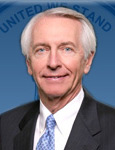Back in 2008, Kentucky Governor Steve Beshear announced that he wanted to shut down 141 Internet gambling sites in the state in an effort to stop unregulated online gaming. He filed a civil suit against the domain names and asked the court to force the sites to block access to Kentucky users or give up control of their domain names.
 "Unlicensed, unregulated, illegal Internet gambling poses a tremendous threat to the citizens of the Commonwealth because of its ease, availability and anonymity," said Beshear back then. "The owners and operators of these illegal sites prey on Kentucky citizens, including our youth, and deprive the Commonwealth of millions of dollars in revenue. It’s an underworld wrought with scams and schemes."
"Unlicensed, unregulated, illegal Internet gambling poses a tremendous threat to the citizens of the Commonwealth because of its ease, availability and anonymity," said Beshear back then. "The owners and operators of these illegal sites prey on Kentucky citizens, including our youth, and deprive the Commonwealth of millions of dollars in revenue. It’s an underworld wrought with scams and schemes."
The Kentucky Supreme Court is expected to make a decision on the case in a set of decisions on January 21.
Beshear has seen a fair amount of criticism for the move, based mostly on the fact that the state of Kentucky does not have a law in place making online gambling illegal. Furthermore, the sites in question are based overseas.
Online Casino Advisory went so far as to launch a boycotting campaign on all taxable gambling products in Kentucky:
A judge in Franklin County Kentucky court saw things Beshear’s way, but the ruling was overturned by an Appeals court before making its way to the Kentucky Supreme Court.
John Pappas, executive director of the Poker Players Alliance (PPA), which has over 13,000 members in the Commonwealth of Kentucky and over a million members in the U.S. once told WebProNews that Governor Beshear’s attempt to block access to online sites in the state "is hypocritical and shortsighted."
Back in March, Attorney Clarke Walton, who owns and operates a site that is affiliated with the poker industry, talked about the case with WebProNews:
The suit is largely looked upon as a joke within the Poker community. Matthew Kredell with Poker news writes, "The lawsuit is ultimately pointless because the sites would continue to operate without their domain names. The only players who type in a domain name are the ones looking to initially download the software, and the search engines could easily be changed to recognize a new address. After the issue arose, Full Tilt Poker bought fulltilt.com as a precaution."
"By blocking online gambling sites in Kentucky, Governor Beshear is also blocking these sites for residents of other states and countries," Pappas said. "This clearly oversteps his bounds as Governor of Kentucky and likely violates several laws including the U.S. Constitution."
In December, state lawyers said they would add names of specific (but publicly unnamed) U.S. citizens to the suit. The industry is optimistic that the KY Supreme Court will reject Beshear’s mission anyway, and that the next step in the process would be the U.S. Supreme Court, which is highly unlikely to hear the case.
Everybody may be finding out the next steps later this month. If the case doesn’t come up then, the next time it may surface would be in March, according to Kredell.
Do you think the state of Kentucky has a legitimate case? Share your thoughts in the comments.
Related Articles:
> Kentucky Governor Cracks Down On Online Gambling
> A Closer Look At Kentucky’s Online Gambling Plan
> Kentucky Judge Rules: Forfeit Gambling Domains
 "We are very excited to bring the thrill and excitement of the World Series of Poker to the social
"We are very excited to bring the thrill and excitement of the World Series of Poker to the social The Internet Gambling Regulation and Consumer Protection and Enforcement Act (H.R. 2267), legislation introduced by Representative Barney Frank (D-MA), Chairman of the House Financial Services Committee, passed by a 41-22 vote.
The Internet Gambling Regulation and Consumer Protection and Enforcement Act (H.R. 2267), legislation introduced by Representative Barney Frank (D-MA), Chairman of the House Financial Services Committee, passed by a 41-22 vote. WebProNews spoke to the Poker Players Alliance about Kentucky’s latest move. "We are in the process of full review of this new action, however, at first blush we seriously questions its merits," said John Pappas, executive director of the
WebProNews spoke to the Poker Players Alliance about Kentucky’s latest move. "We are in the process of full review of this new action, however, at first blush we seriously questions its merits," said John Pappas, executive director of the 

 Carruthers, a citizen of the United Kingdom, was hired by BetOnSports founder, Gary Kaplan, in 2000 as CEO of the online wagering company, which was based in Costa Rica.
Carruthers, a citizen of the United Kingdom, was hired by BetOnSports founder, Gary Kaplan, in 2000 as CEO of the online wagering company, which was based in Costa Rica.